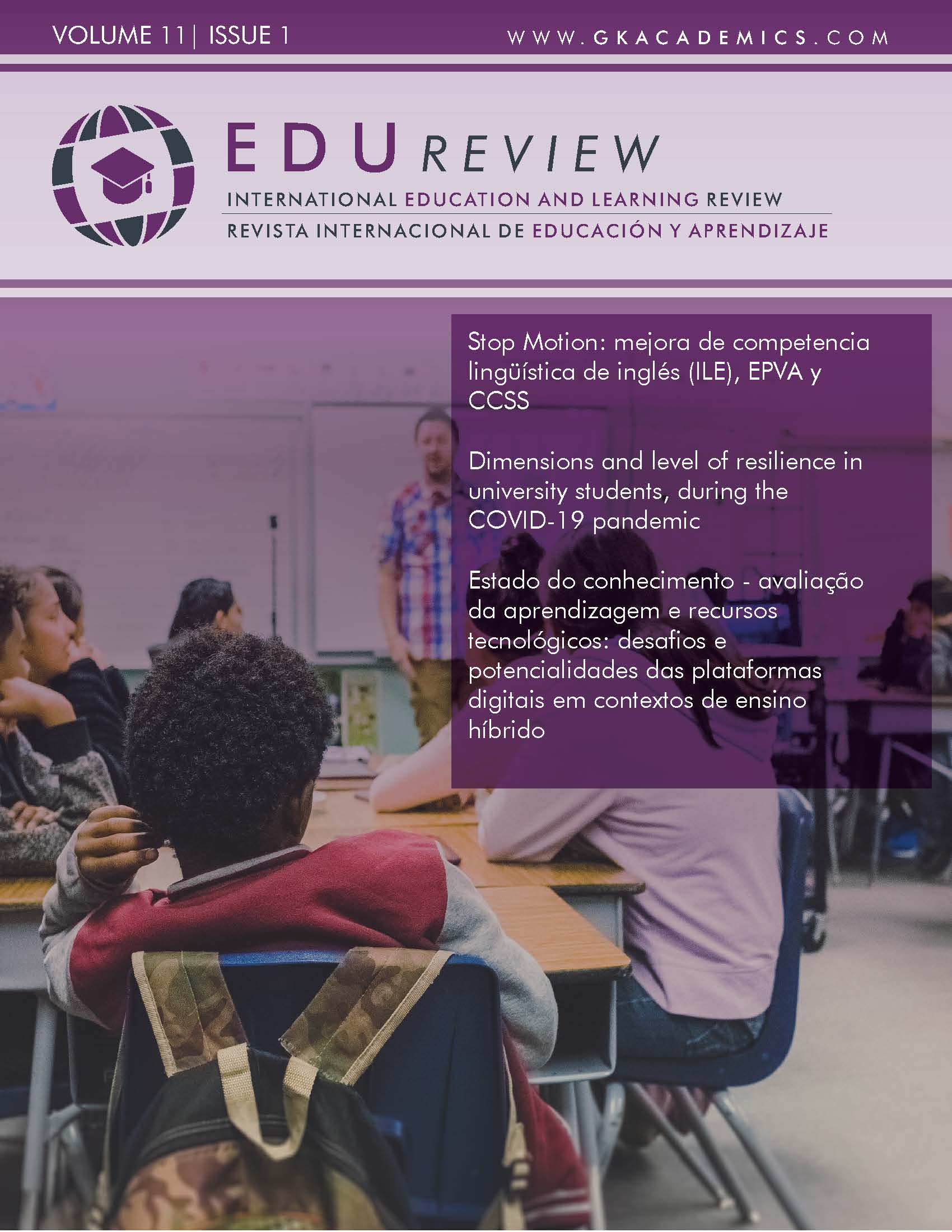El aprendizaje activo
La experiencia en un curso introductorio de la Escuela de Informática Universidad Nacional de Costa Rica
DOI:
https://doi.org/10.37467/revedu.v11.4538Palabras clave:
Aprendizaje activo, Programación, Informática, Facilitador, Estudiante, RecursosResumen
Este trabajo, aplica la metodología de aprendizaje activo a estudiantes del primer curso de la carrera de Ingeniería en Sistemas de Información de la Universidad Nacional, denominado Fundamentos de Informática. Esta metodología se adaptó muy bien en la situación de la pandemia originada por COVID-19. Para este trabajo descriptivo explicativo, se utilizó un formulario en línea con el fin de conocer la percepción de una muestra por conveniencia, de N=74 estudiantes. La mayoría considera que el uso de MS Teams y el IDE Zinjai, así como también las actividades que fomentan el aprendizaje activo, favorecieron su proceso de aprendizaje.
Descargas
Estadísticas globales ℹ️
|
1011
Visualizaciones
|
440
Descargas
|
|
1451
Total
|
|
Citas
Cámara Estrella, Á. M., Díaz Pareja, E. M. y Ortega Tudela, J. M. (2015). Desarrollo de competencias de aprendizaje en alumnos universitarios. REDU. Revista de Docencia Universitaria, 13(2), 233-248. DOI: https://doi.org/10.4995/redu.2015.5446
Gómez Gómez, J. E. (2010). Aproximación metodológica para el diseño de actividades de aprendizaje activo soportadas en conciencia contextual. https://bit.ly/3XGenLi
Guerrero, G. L. (2004). La educación en el contexto de la globalización. Revista historia de la educación latinoamericana, 6(6), 343-354.
Halili, S. H., & Zainuddin, Z. (2015). Flipping the classroom: What we know and what we don't. The online Journal of Distance Education and E-learning, 3(1).
Hernández Ruiz, Irene y Gómez Toaza Kerly (2019). ¿Cómo la herramienta Kahoot! motiva a estudiantes repitentes? Universidad Nacional Costa Rica. DOI: https://doi.org/10.15359/cicen.1.1
Hernández-Ruiz, I. y Gómez-Fernández, C. (2021). Proyecto Creando Capacidades de Programación en Jóvenes y Docentes tanto en Secundaria como en Enseñanza Superior y su desafío ante el COVID-19. Revista De Extensión Universidad En Diálogo, 11(2), 125-140. https://doi.org/10.15359/udre.11-2.6 DOI: https://doi.org/10.15359/udre.11-2.6
Jerez Yáñez, O. (2015). Aprendizaje activo, diversidad e inclusión. Enfoque, metodologías y recomendaciones para su implementación. Ediciones Universidad de Chile. https://repositorio.uchile.cl/handle/2250/136742
Lobo, J. C. y del Sur, M. (2014). Juegos serios: alternativa innovadora. Conocimiento Libre y Educación (CLED), 2(2).
Lykke, M., Coto, M., Jantzen, C., Mora, S., & Vandel, N. (2015). Motivating Students through Positive Learning Experiences: A Comparison of Three Learning Designs for Computer Programming Courses. Journal of Problem Based Learning in Higher Education, 3(2), 80-108.
Martín, A. C. U. y Aznar, C. T. (2015). Juegos serios como instrumento facilitador del aprendizaje: evidencia empírica. Opción, 31(3), 1201-1220.
Meza-Intriago, F. H. y Vásquez-Giler, M. (2021). Comunicación en Línea en la educación sincrónica y asincrónica en el pre-universitario. Revista Científica Arbitrada de Investigación en Comunicación, Marketing y Empresa REICOMUNICAR, 4(8, Ed. esp.), 29-47. https://doi.org/10.46296/rc.v4i8edesp.0032 DOI: https://doi.org/10.46296/rc.v4i8edesp.0032
Montoya, N. (2013). El aprendizaje basado en problemas (ABP) como estrategia didáctica. Revista Academia y Virtualidad, 6(1), 53-61.
García-Mundo, L. del C., Enríquez, J. V., Genero, M. y Velthuis, M. G. P. (2014). ¿Contribuye el Uso de Juegos Serios a Mejorar el Aprendizaje en el Área de la Informática? JENUI 2014 XX Jornadas de Enseñanza Universitaria de la Informática, del 9 al 11 de Julio Oviedo 2014, pp. 303-310. https://dialnet.unirioja.es/servlet/articulo?codigo=7368155
Prieto, A. y Álvarez, S. (2021). Eficacia del modelo de aula invertida (flipped classroom) en la enseñanza universitaria: una síntesis de las mejores evidencias. Recuperado 9 de octubre de 2022, de https://bit.ly/3ZLmub5
Mora Rivera, S., & Coto Chotto, M. (2017). Contributing to the OER movement: A practical experience: The case of the Informatics School, UNA. 2017 XLIII Latin American Computer Conference (CLEI), 1-11. https://doi.org/10.1109/CLEI.2017.8226427 DOI: https://doi.org/10.1109/CLEI.2017.8226427
Serrano, K. P. R., Restrepo, M. A. M. y Posada, J. S. J. (2012). Educación en Ingenierías: de las clases magistrales a la pedagogía del aprendizaje activo. Ingeniería y Desarrollo, 30(1), 125-142. https://bit.ly/3kpnZeZ
Ruiz, I. H., & Carvajal, L. A. F. (2021). Analysis of the educational resources used in the course Fundamentals of Informatics in the face of the COVID-19 pandemic. 2021 XVI Latin American Conference on Learning Technologies (LACLO), 486-489. https://bit.ly/3w8C2Z3 DOI: https://doi.org/10.1109/LACLO54177.2021.00085
Saldarriaga-Zambrano, P. J., Bravo-Cedeño, G. D. R. y Loor-Rivadeneira, M. R. (2016). La teoría constructivista de Jean Piaget y su significación para la pedagogía contemporánea. Dominio de las Ciencias, 2(3 Especial), 127-137.
Sánchez, R. S. (2019). Influencia de la teoría de Piaget en la enseñanza de la Física. Latin-American Journal of Physics Education, 13(3), 7.
Taipe, M. S. A., Pesántez, D. Á., Rivera, L. y Vizueta, D. O. (2017). Juegos Serios en el Proceso de Aprendizaje. Revista UTCiencia, 4(2), 111-122. https://bit.ly/3XvWpLk
Descargas
Publicado
Cómo citar
Número
Sección
Licencia
Los autores/as que publiquen en esta revista aceptan las siguientes condiciones:
- Los autores/as conservan los derechos de autor.
- Los autores/as ceden a la revista el derecho de la primera publicación. La revista también posee los derechos de edición.
- Todos los contenidos publicados se regulan mediante una Licencia Atribución/Reconocimiento-SinDerivados 4.0 Internacional. Acceda a la versión informativa y texto legal de la licencia. En virtud de ello, se permite a terceros utilizar lo publicado siempre que mencionen la autoría del trabajo y a la primera publicación en esta revista. Si transforma el material, no podrá distribuir el trabajo modificado.
- Los autores/as pueden realizar otros acuerdos contractuales independientes y adicionales para la distribución no exclusiva de la versión del artículo publicado en esta revista (p. ej., incluirlo en un repositorio institucional o publicarlo en un libro) siempre que indiquen claramente que el trabajo se publicó por primera vez en esta revista.
- Se permite y recomienda a los autores/as a publicar su trabajo en Internet (por ejemplo en páginas institucionales o personales), una vez publicado en la revista y citando a la misma ya que puede conducir a intercambios productivos y a una mayor y más rápida difusión del trabajo publicado (vea The Effect of Open Access).













